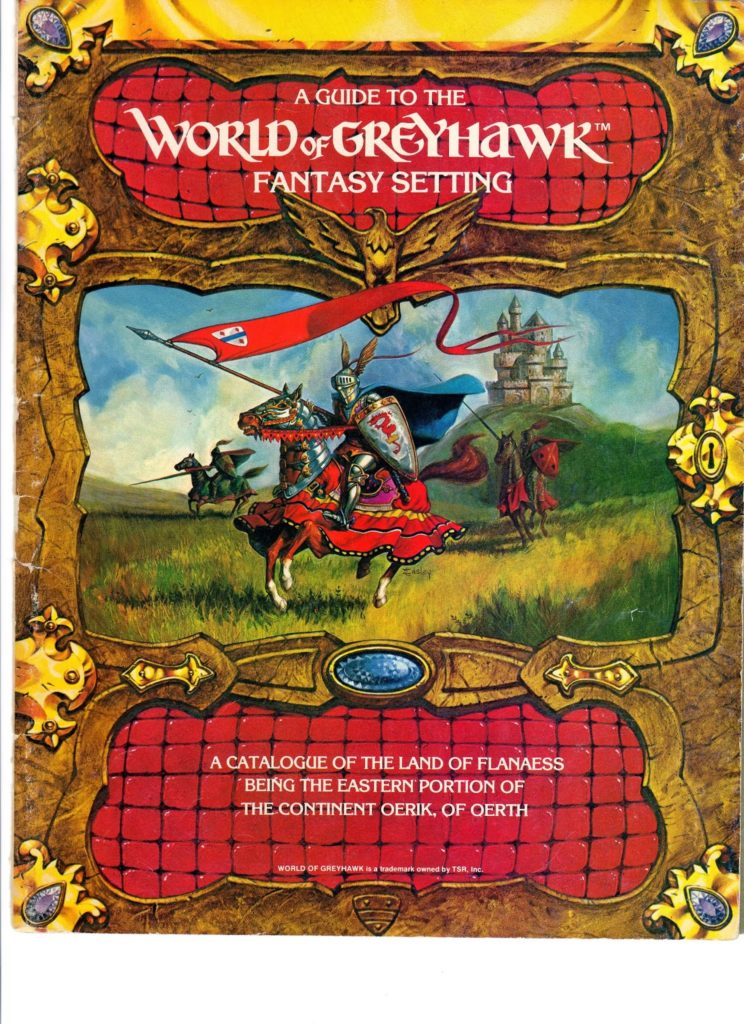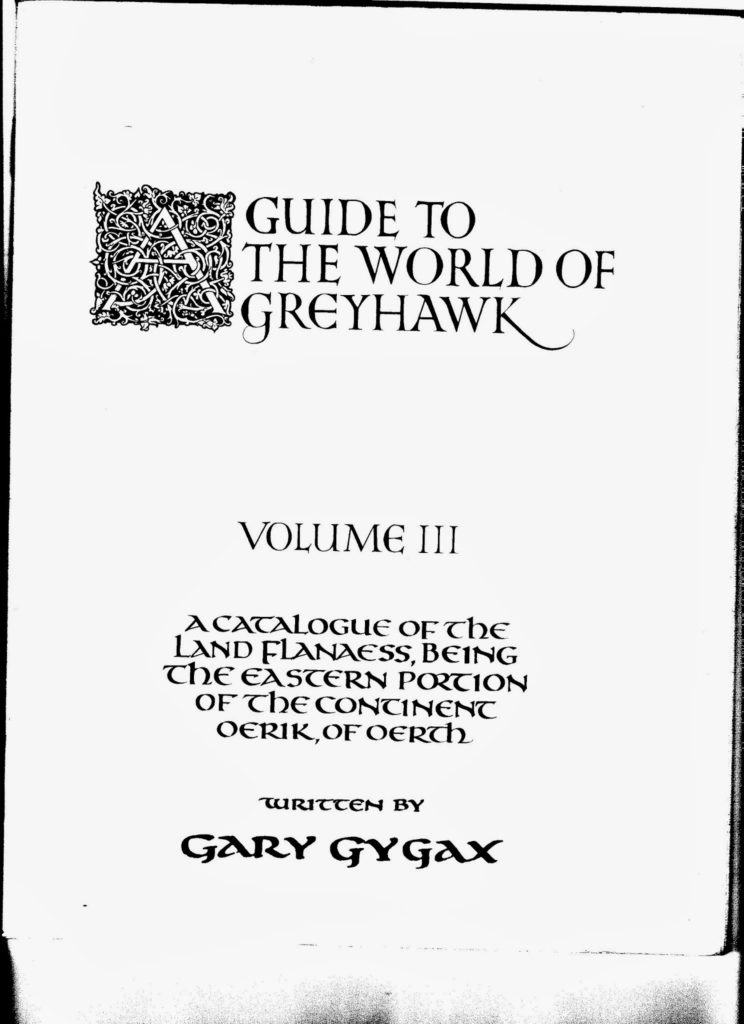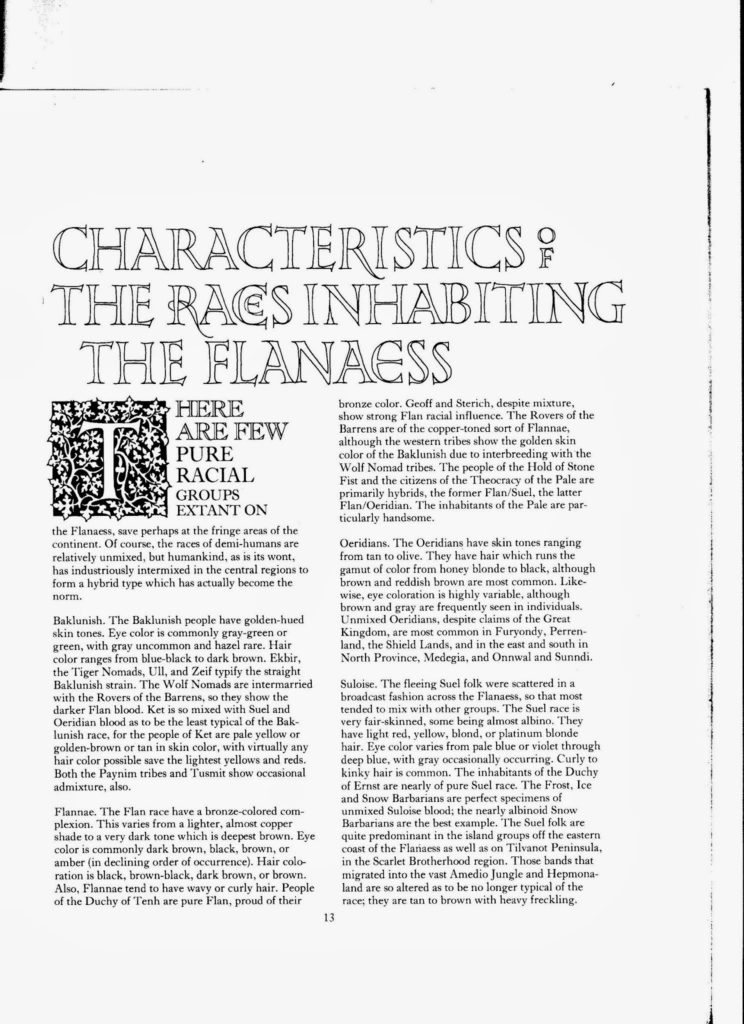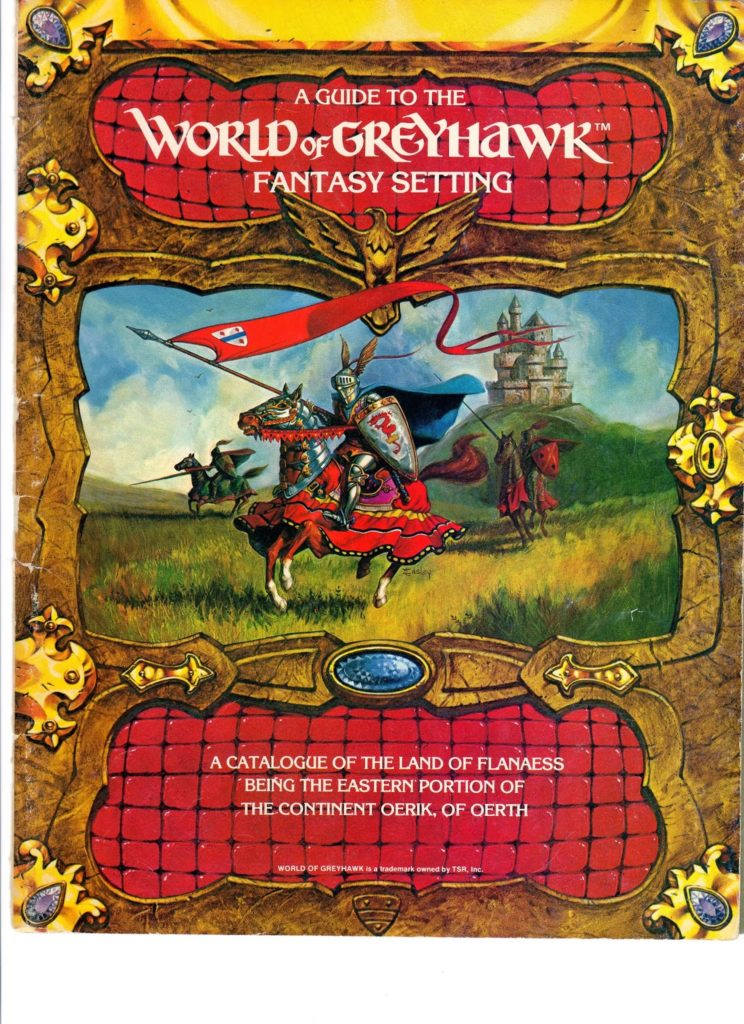 |
| “A catalogue of the land of Flanaess…” |
Sometimes things have been staring you in the face, literally for nearly thirty-five years, and you only notice them when they happen to catch your eye.
For as long as I’ve been aware, fans of the World of Greyhawk setting have referred to the northeastern portion of the continent of Oerik as “The Flanaess”. With the definite article “the” always included.
 |
| “A catalogue of the Land Flanaess, being…” |
But when I look at the Guide to the World of Greyhawk, one of the two books in the original gold box set, I find that “Flanaess” is often used, conspicuously without the “the”. We see the opposite in other places in the book, such as on p. 13, which uses “the Flanaess” regularly.
What to make of this?
Surely “Flanaess” would be analogous, linguistically, to “Europe”. That would make a bunch of sense geographically as well, considering that Europe, as a continent abutting Asia, is analogous to Flanaess, a continent abutting Oerik.
 |
| “Characteristics of the races inhabiting The Flanaess” |
I can’t think of a single instance in which someone would say “The Europe” and have it make any sense. It’s simply an anomaly.
It’s odd, the things that catch your eye after all that time. Did Gygax change from “Flanaess” (as a straight linguistic replacement of “Europe”) to “The Flanaess” (to add a sense of the exotic)? I am unaware of any straight answer to that question – anyone know of one? Maybe a Q&A on some message board somewhere?










"I can't think of a single instance in which someone would say "The Europe""
But someone might say "the EU" which you probably hear a lot.
Not that it explains anything.
Yeah, but the article there is referencing "Union." "European" is an adjective.
I have always thought of it as a word meaning something like "known world". Or, "Place of the Flan". Or some such. Point is, the word "the" can be used, or not.
I think it is likely another example of "the" amateur proofreading.
I can remember an edition of Gamma World where one of the mutations was The Gamma Eye, alphabetized under T.
I just checked my copy of the 1980 Greyhawk Gazetteer and it's pretty consistent about using 'the Flanaess'. While I don't have any information about why EGG chose it, it does put me in mind of the Elizabethan terminology of 'the Brazils'. Secondary speculation is that he intended it as a plural noun meaning the lands inhabited by the Flan. It's an intriguing question.
Hmmmm: an interesting find, Joe.
I'd ask Steve Winter, since he edited the boxed set BITD, and see if he remembers a shift in editorial direction there, or anything else relevant.
Allan.
Being that many fans equate the Flan people as least partly to Native North Americans, I don't find any issue with saying 'THE flanaess'.
When referring to the lands controlled by those groups, one usually says 'The Seminole Nation' or 'The Navajo Nation', etc. Logically, you'd then say 'The Flan Nation'.
None of these, real world Native or fantasy world Flan, really represent one strong politically cohesive entity. When someone says 'Navajo Nation', they usually mean the socio-political group of people of Navajo ancestry, or the general geographic region where those folks live.
I'd apply this to the Flan as well, and assume that when Pluffet Smedger penned the Glossographies, he used the term "Flan-aess (flan nation)" to indicate that portion of Oerik that was originally occupied by the Flan people, before the great migrations of the Suel and Oeridians.
Never owned or fully read any of the GH materials, but certainly know the reference.
I always assumed The Flanaess referred to a plural group of, say, Flanae Clans, with embers known as Flana. Turns out I was close… about the people, anyway.
Like The Americas are all populated (by definition) by Americans. They in turn comes in a huge array of groupings (Columbians, US Americans, Canadians, Mexicans, Costra Ricans, etc.)
In my original assumption there was a "country" named Flanae in the region known as The Flanaess. Like having a New York, New York address.
I guess if I'd known the material as well as you had, it might've stood out to me to. Maybe not.
@
I'm thinking more along the lines of usage akin to "the Benelux" in western Europe.
One more point here, crossposted from the Greyhawk G+ community.
There's a key difference in etymology here. Flanaess is derived from the word Flan, we can assume it means Flan-Lands/Flan-Realms/Flan-Nations/etc. Europe doesn't, to my knowledge, refer to any specific group of people, but is derived from greek or semitic terms simply refering to the body of land that now bears the name.
So, Europe is a place name, a proper noun, and just as you wouldn't refer to me as "the" Richard, you don't generally add 'the' before Europe.
Flanaess seems to be technically a contraction of an adjective "Flan" and a noun "Land/Nation/Realm", so in queen's proper english, you would say "The Flan lands (the flan realms, the flan nations, et al)".
Honestly, that's just how I thought of it over the years, never really giving it deep consideration until your query. Sometimes we just have to roll with Gygax's often quirky verbosity and move on. Interesting topic though, curious to see what others think.
In the Gazetteer of the folio edition, however, "The Flanaess" is used concurrently with "Flanaess", though the former usage is much more common. Page 5: "The Flanaess is particularly blessed in regard to its weather", "Migrating bands began settling the eastern portion of the Oerik Continent, Flanaess, over a millenium ago", "For two centuries the Oerid and Suel battled each other and the fragmenting humanoid hordes for possession of the central area of the Flanaess", "The success of the Oeridian domination of so much of the Flanaess…". Page 6: "Evil is in the ascendancy everywhere in the Flanaess…", "Furyondy and Veluna in the central Flanaess are strong in the cause of justice and good". Page 8: "The current state of affairs in the Flanaess is confused indeed". Not sure what to make of that.
Strangely enough, The Gambia is the name of the country. It would be incorrect to omit 'the'. My friend did some oversees work there and it was interesting to hear her tell of everyone's insistence on including "the".
Something similar from the real world would be "the Balkans", or maybe even "the Bronx".
Well, there's "the Levant", "the Maghreb", "the Caucasus", "the Midwest" and so on for regions; "the Sudan" and "the Netherlands" for individual states; etc. In English there's a tendency for proper names to be anarthrous (bonus term of art for all y'all non-linguists), but it's a tendency. Cross-linguistically there are distinctions: English "Switzerland" versus German "der Schweiz" or French "la Suisse".
Variation is usual in language use, and as a linguist I'm a staunch descriptivist, so I'm happy with optionality in this regard.
I've always pictured Oerik as analogous to the whole of Eurasia, not just Europe; the Flanaess is analogous to the latter.
Another thing about variation: ask a Californian one of these days whether they call it "the 5" or just "I-5" without the article, but brace yourself…
Maybe this is what set in motion to the breakup of the Great Kingdom.
I figure that there was an assumed "land" in "the Flanaess," which matches with the description on the frontispiece of "the land Flanaess." Maybe "Flanaess" in Old Oeridian is an adjective and it doesn't make sense to use it without the definite article.
That's why I love this blog. Where else can I listen to a discussion about the importance of the word "the" in Greyhawk lore?
This reminds me of the difference between "Ukraine" and "the Ukraine," which stems from (mostly Russian) claims that "Ukraine" means "borderland" and hence isn't really the name of a nation. The inhabitants would disagree, and hence prefer "Ukraine." What does "Flanaess" actually mean? Do we know?